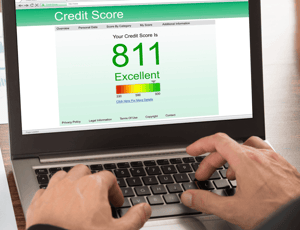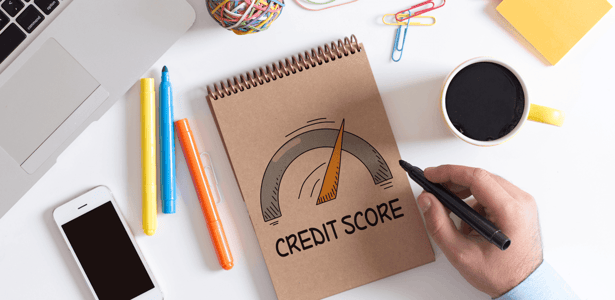Prospective home buyers know their credit score is very important in determining whether or not they can get an affordable mortgage at an attractive rate.
Credit scores have become even more important since the Canadian government passed new rules that have made it harder for banks and financial institutions to lend money.
Before you approach a bank or financial institution, it's essential you prepare for your mortgage application by understanding what your credit score means and exactly how it will affect your ability to get a loan at a favourable rate.
 What Is a Credit Score?
What Is a Credit Score?
Credit scores range from 300 (the worst possible score) to 900 (the best).
In Canada, credit scores are determined by two different agencies: Equifax Canada and TransUnion Canada. By law, these agencies are required to provide a credit report to you for free, but only once a year.
Each of these two agencies maintains a report on your history, but the information they have about you may differ between agencies. Each agency receives information about you whenever you borrow and repay money from a business that reports to the agency. This means the two credit reporting agencies might have a different credit score for you.
Unfortunately, the only free information you can get from the credit reporting agencies is your credit report (see below), not your credit score. You can, of course, pay to learn your credit score, but it's also possible to calculate an estimate of your credit score based on your credit report for free.
Credit Report
Your credit score is shorthand for your overall financial "health," but credit rating agencies keep detailed records on your financial history called your credit report.
Credit ratings agencies use a scale of 1-9 to rate how quickly you have paid off debts in the past:
- A rating of "1" means you paid off the debt within 30 days of the due date.
- A rating of "9" means you either never paid off the debt or you have a debt repayment agreement with the lender.
In addition, the credit ratings agencies use letters to describe what kind of debts you have incurred:
- I - Stands for "instalment," as in, you have a mortgage or car loan that you're paying off in installments.
- O - Stands for an "open" credit where you can continue to borrow money for a specified period of time, but need to pay it off completely at the end of the term. This can include student loans as well as lines of credit.
- R - Stands for "revolving" credit where you can pay minimum amounts while still borrowing more money. Generally speaking, "R" is used for credit card debt.
Credit ratings agencies combine the two systems, so an "I1" debt could mean you regularly paid off a car loan in a timely manner, but an "R2" rating could mean you've been tardy in paying off some credit card debt.
If you see incorrect information on your credit report, it's essential you contact the rating agency to correct this as soon as possible.
 Frequently Asked Questions About Credit Scores
Frequently Asked Questions About Credit Scores
Here are a few common (debunked) beliefs about credit scores:
Everyone Has Exactly One Credit Score
Not true. Equifax and TransUnion update their files on you at different times, receive different information from businesses, and use slightly different formulas to calculate your credit score. When a bank is evaluating you for the purpose of obtaining a mortgage, they may rely on just one credit reporting agency or both.
Your Spouse Has An Identical Credit Score
Not true. Every adult has a different debt history and therefore a different credit score. Even if all your debts are joint debts, some credit reporting agencies file the information under just one person's name.
Having a Good Job Improves Your Credit Score
Not true. Credit reporting agencies don't care about your income, only how reliable you've been in repaying debts.
Being Debt Free Means You Have a Perfect Credit Score
Not true. Your credit score is based on both how much debt you've assumed as well as how timely you've been at paying it back. A person with a lot of debt who is making regular payments can get a higher credit score than someone with no debt at all (and therefore no proof of their reliability in paying off debts.)
Bankruptcy Permanently Ruins Your Credit Score
Not true. Filing for bankruptcy will severely damage your credit score, but if you've been diligent about paying debts for six years, your credit score will start to improve.
Checking Your Credit Score Negatively Affects It
Only partially true. If banks or other lenders are making multiple inquiries in a really short amount of time, for mortgage pre-approvals for instance, this will negatively affect your credit score. But when you request your own credit report from the credit reporting agencies, this will NOT affect your credit score.
Credit Scores Are Forever
Not even close to being true. Your credit score can change on a monthly basis. If you want to improve your credit score, you need to make sure you're paying off all your debt(s) on a timely basis.
Every person has two (potentially different) credit scores, calculated by the two credit rating agencies. Before you begin looking for a mortgage, obtain your credit report and/or credit scores. If you have a low credit score, begin repairing it by paying off your debts in a timely manner and closing any unused open lines of credit.
Remember, the better your credit score, the better the terms and conditions you'll get on your mortgage.



 What Is a Credit Score?
What Is a Credit Score? Frequently Asked Questions About Credit Scores
Frequently Asked Questions About Credit Scores
